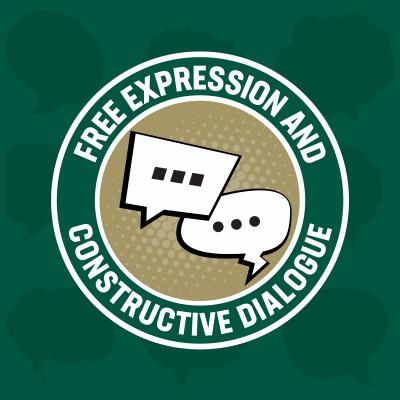SANCTUARY DISCUSSIONS
Sick of the divide? Break free from polarization! Join us to collaborate and engage in constructive dialogue.
Open to ALL Majors!
Discussion Topic: Housing and the Meaning of Home
No prior knowledge about housing issues necessary.
Applications due March 9th at 11:59 p.m. (Applicants will be notified March 11th)
The Sanctuary Discussion Method for Constructive Dialogue

- Dr. Scott Fitzgerald will engage a group of 24 student volunteers in spring 2025 to learn about and participate in the Sanctuary Discussion method. This method was initially developed by the Interactivity Foundation and previously adapted by Dr. Fitzgerald for semester-long classroom use. The proposed activity is a simplified and condensed process designed to introduce students to the approach, demonstrate facilitation skills, and to collectively explore ideas in a non-competitive environment.
- The Interactivity Foundation is a non-advocacy, non-partisan, public policy foundation, whose goal is to enhance public thinking about public policy. It directly encourages broad political reasoning about the overall goals and values that might shape public policy. The discussion process is intended to facilitate an unhurried, wide-ranging and conceptual approach to a complex area of public policy concern (e.g. housing). It also encourages the discussion of dimensions of public policy that often might be overlooked (such as ethical, psychological, social and cultural dimensions). It is a structured process that teaches and models collaborative thinking.
- Logistics:
- Location: On Campus, TBD
- Time: 5:30 p.m. – 8:00 p.m.
- Dates: Wednesday 3/26/2025, Wednesday 4/2/2025, Wednesday 4/16/2025
- Dinner will be provided at each session.
- Each participant will receive a $40 gift card upon successful completion of all three sessions.
- Participants will be eligible for future constructive dialogue opportunities.
Key Elements of “Sanctuary Discussions”:
- A sanctuary environment is one in which participants feel comfortable in expressing ideas and feel that their ideas will be respected by others. A sanctuary environment represents a protected space for sharing and developing ideas in a collaborative manner.
- The discussion tone is one of generosity of spirit rather than competition. Think of this as “conversation” rather than ” debate.” Each participant is expected both to help other participants understand the ideas that come up and to help other participants clarify their own thinking about these ideas. There is no attempt at “winning” over others
- Separate ideas from persons. By dealing with the content of ideas without worrying about who believes in them or who introduced them, the participants can be encouraged to work collaboratively, since the onus of personal ownership falls away. This lowers the stakes for participation. Participants may speak more freely when they realize they are not the ones on the line; it’s the ideas that will be discussed and evaluated. This can also encourage participants to think from new perspectives, to imagine how others might think. Finally, it encourages the collegial development of ideas, the emergence of a vital group spirit, since personal ownership falls by the wayside.
This program is sponsored by the Free Expression and Constructive Dialogue task force.
